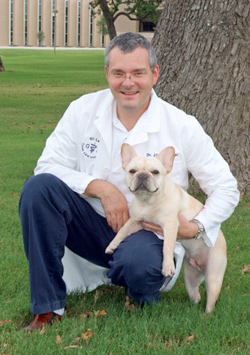GI Lab Works to Improve Companion Animal Health
“We’re the only diagnostic laboratory in the world that focuses solely on gastrointestinal diseases in companion animals,” said Dr. Jörg Steiner, associate professor of small animal internal medicine and director of the Gastrointestinal Laboratory (GI Lab) at the Texas A&M University College of Veterinary Medicine & Biomedical Sciences (CVM).

“The frequency of gastrointestinal diseases in dogs and cats is very high,” said Steiner, explaining the importance of focusing attention on these diseases. “We’re dealing with disorders that have a huge impact on animals’ lives and therefore peoples’ lives. For example, a lot of animals are abandoned because they have chronic diarrhea. The owners can’t deal with the economic and emotional burden of the disease. If we can make these animals better, we can save their lives.”
Over the past 25 years, the GI lab has excelled at precisely this mission. The lab has pioneered the development of tests for the diagnosis of gastrointestinal diseases; has been involved in research on the pathogenesis, genetic origin, diagnosis and treatment of these diseases; and has contributed to training in this field by establishing a combined PhD-residency program in small animal gastroenterology, the only one of its kind in North America.
These noteworthy achievements began with a test developed in 1985 by Dr. David Williams, founder of the GI Lab at the University of Florida, for diagnosing canine exocrine pancreatic insufficiency, a disorder in which food digestion is impaired because of a lack of pancreatic digestive enzymes. The lab then moved several times, first to Kansas State University and then to Purdue University. It was finally housed at Texas A&M in 1997. Steiner assumed directorship of the GI Lab in 2005, replacing Williams, who continues to be involved in the lab’s service activities.
Over the course of its lifetime, the lab has grown its diagnostic repertoire to cover a range of tests for the assessment of gastrointestinal health and disease. These include testing for the vitamins cobalamin and folate, deficiencies of which are associated with gastrointestinal disorders; tests for gastrointestinal infections caused by protozoans and bacteria; tests for pancreatitis; and tests for inflammatory markers of chronic gastrointestinal disease, for example, C-reactive protein.
Some of these tests are unique in that they are only available through the Texas A&M GI Lab. Others, for example, the test for the diagnosis of pancreatitis in dogs and cats, have become accepted as a gold standard and have been licensed to commercial diagnostic laboratories that can make them available to veterinarians worldwide.
Staffed by a team of about 40 veterinary graduate students, technicians, consultants and student workers, the lab processes about 1000 samples a week sent in by veterinarians across the globe.
“Although 99% of the service [the GI lab offers] is directed toward cats and dogs, whenever there is somebody with a question that they can’t answer but believe that we can help them, we’re happy to work with them,” said Steiner.
Over the years, this willingness to expand the reach of the service has led to the GI lab being involved in the diagnosis of pancreatitis in a sea lion, collaborating with a group in the University of San Antonio to study gastrointestinal disease in marmosets, and developing diagnostic tests for use in ferrets.
The lab also works toward enhancing patient care by providing consultation services. Veterinarians who have submitted patient samples for testing can discuss test results and treatment options with the lab’s board-certified internal medicine specialists.
Steiner’s future goals include expanding the lab’s research focus to include the field of gastrointestinal endocrinology [the study of hormones that regulate digestion].
“The gastrointestinal tract is considered to be the largest endocrine gland in the body. And yet the only endocrine diseases of the gastrointestinal tract that we know of are diabetes mellitus, caused by an underproduction of insulin, or tumors, leading to an overproduction of gut hormones. We do not know of any gastrointestinal disease associated with the underproduction of other gut hormones, for example, the underproduction of gastrin, cholecystokinin or somatostatin. These diseases have not been described either in people or in dogs and cats. So one of my goals is to look at this interesting research area.”
Fulfillment of these goals requires funding, which has so far been a challenge.
Steiner hopes that “individual endowments from one or several people will help catapult these programs forward” and in doing so will help support a lab that through its research is committed to helping “promote gastrointestinal health in companion animals on a daily basis.”


